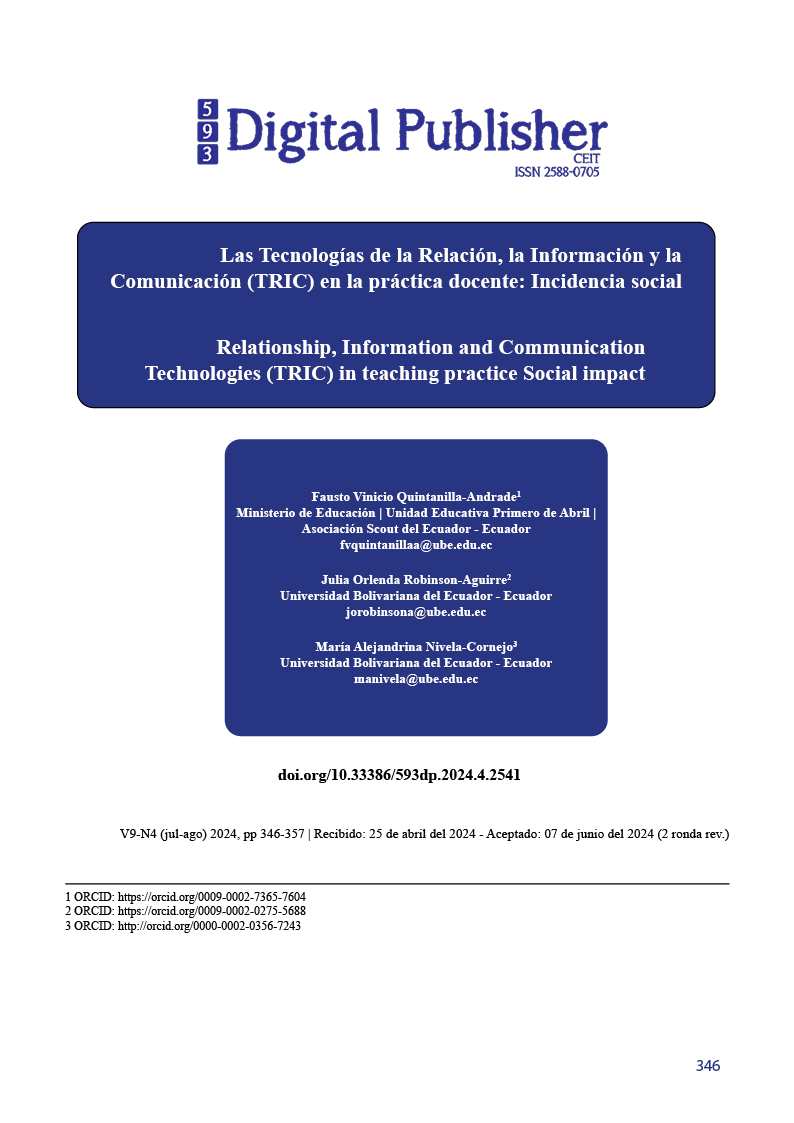Las Tecnologías de la Relación, la Información y la Comunicación (TRIC) en la práctica docente: Incidencia social
Contenido principal del artículo
Resumen
Este estudio examinó el impacto social de las Tecnologías de la Relación, la Información y la Comunicación (TRIC) en la labor de enseñanza de los docentes. Utilizando un enfoque sociocrítico y cuanti-cualitativo, se encuestó a 50 profesores. Los resultados revelaron un amplio consenso sobre la importancia de integrar de manera estratégica las TRIC en los procesos de enseñanza-aprendizaje, desde perspectivas pedagógicas, tecnológicas, sociales y éticas. La mayoría abrumadora consideró fundamental utilizar estas herramientas educativas para mejorar la interacción entre los participantes, fomentar aprendizajes significativos y desarrollar habilidades pertinentes para el siglo XXI. Además, se destacó la necesidad de incorporar las TRIC siguiendo principios éticos que maximicen sus beneficios y minimicen los riesgos. Estas percepciones respaldan los marcos teóricos existentes sobre el papel de las tecnologías en entornos educativos inclusivos y de calidad. Los resultados aportan pruebas empíricas concluyentes sobre el potencial de las TRIC como facilitadoras del aprendizaje, respaldando la hipótesis de investigación acerca de su impacto positivo en las aulas. El estudio subraya la importancia de integrar estratégicamente estas herramientas en la práctica docente, tomando en cuenta aspectos pedagógicos, técnicos, sociales y éticos para una educación relevante. Se identifica la necesidad de realizar más investigaciones sobre buenas prácticas de integración y formación docente en este ámbito.
Descargas
Detalles del artículo

Esta obra está bajo una licencia internacional Creative Commons Atribución-NoComercial-CompartirIgual 4.0.
1. Derechos de autor
Las obras que se publican en 593 Digital Publisher CEIT están sujetas a los siguientes términos:
1.1. 593 Digital Publisher CEIT, conserva los derechos patrimoniales (copyright) de las obras publicadas, favorece y permite la reutilización de las mismas bajo la licencia Licencia Creative Commons 4.0 de Reconocimiento-NoComercial-CompartirIgual 4.0, por lo cual se pueden copiar, usar, difundir, transmitir y exponer públicamente, siempre que:
1.1.a. Se cite la autoría y fuente original de su publicación (revista, editorial, URL).
1.1.b. No se usen para fines comerciales u onerosos.
1.1.c. Se mencione la existencia y especificaciones de esta licencia de uso.
Citas
Aguinaga, I. & Mendizabal, G. (2018). Incidencia social: concepto y aplicaciones. Revista Internacional de Sociología, 76(1), 1-17. https://doi.org/10.3989/ris.2018.76.1.08
Aranda, D. & Sánchez-Navarro, J. (2015). El uso de las TIC en la práctica educativa cotidiana. Comunicar, 44, 77-85. https://doi.org/10.3916/C44-2015-08
Area, M., & Pessoa, T. (2018). The impact of ICT on student learning: An analysis of PISA data. Computers & Education, 122, 139-152.
Balakrishnan, V. (2017). Overcoming digital divides: A phenomenological study of a technology integration initiative. TechTrends, 61(3), 220-227. https://doi.org/10.1007/s11528-016-0134-6
Cabero, J. y Llorente, M. C. (2018). Tecnologías emergentes y competencias docentes. Edutec. Revista Electrónica de Tecnología Educativa, 59, 1-12. https://doi.org/10.21556/edutec.2018.59.918
Cabero, J., & Barroso, J. (2019). La brecha digital y la educación: Un análisis desde la perspectiva sociocultural. RIED. Revista Iberoamericana de Educación a Distancia, 22(2), 145-166.
Cabero-Almenara, J., y Palacios-Rodríguez, A. (2020). Marco Europeo de Competencia Digital Docente «DigCompEdu». Traducción y adaptación del cuestionario «DigCompEdu Check-In». EDMETIC, Revista de Educación Mediática y TIC, 9(1), 213-234. https://doi.org/10.21071/edmetic.v9i1.12462
DeLuca, C. et al. (2019). Establishing a Culture of Feedback for Students Through Facilitated Peer Review. College Teaching, 67(4), 231–242. https://doi.org/10.1080/87567555.2019.1654123
Gallego, B., García, I., & García, M. (2019). La profesionalización docente como fundamento de la práctica educativa. Tendencias Pedagógicas, 34, 151-169. https://doi.org/10.15366/tp2019.34.009
García-Martín, J. y García-Sánchez, J. N. (2020). Percepción del profesorado universitario sobre el uso y la integración de las TIC en la docencia. @tic. Revista D'Innovació Educativa, 20, 82-95. https://doi.org/10.7203/attic.20.16683
García-Ruiz, M. & Estalayo, E. (2021). La incidencia social de las prácticas profesionales en estudiantes de traducción e interpretación. Estudios sobre Educación, 41, 169-187. https://doi.org/10.15581/004.41.169-187
García-Ruiz, M. A. y García-López, E. (2020). Metodología de la investigación cualitativa. Pirámide.
González, A., & Martínez, R. (2021). The role of ICT in enhancing teaching and learning. Journal of Technology in Education, 5(1), 77-89.
Hernández-Sampieri, R., y Mendoza, C. P. (2018). Metodología de la investigación: Las rutas cuantitativa, cualitativa y mixta. McGraw-Hill.
Horn, I. S. & Fisher, J. F. (2017). Transformation of Teacher Capacity Through Collaborative Professional Development: A Visible Learning Approach. TES: Teaching & Teacher Education, 67, 361-371. https://doi.org/10.1016/j.tate.2017.06.015
Isaías, P., Reis, Z., Coutinho, C. y Lencastre, J. A. (2018). Estudio preliminar sobre el impacto de las TIC en la vida cotidiana. Comunicar, 26(56), 9-18. https://doi.org/10.3916/C56-2018-01
Johnson, L. (2019). The impact of information and communication technologies on teaching practices. Journal of Education and Technology, 4(2), 45-56.
Johnson, L., Adams Becker, S., Estrada, V., Freeman, A. (2016). NMC Horizon Report: 2016 Higher Education Edition. Austin, Texas: The New Media Consortium.
López, D., Estalayo, L., Robledo, C., Corral, R. y Arruti, A. (2018). Las TIC en el ámbito educativo: una visión desde la didáctica. RIDE. Revista Iberoamericana para la Investigación y el Desarrollo Educativo, 8(16), 145-157. https://doi.org/10.23913/ride.v8i16.336
Ministerio de Educación. (2018). Estrategia nacional de tecnologías para la educación 2018-2021. https://www.mineduc.cl/wp-content/uploads/sites/19/2018/08/estrategia_nacional_de_tecnologias_para_la_educacion_2018-2021.pdf
Pérez, L. (2018). La incidencia social: una aproximación conceptual. Revista Internacional de Sociología, 76(2), e050. https://doi.org/10.3989/ris.2018.02.12
Pérez, M. (2022). Communication and collaboration in education through ICT. Journal of Education and Technology, 6(2), 67-78.
Prendes, M. P., Castañeda, L. y Gutiérrez, I. (2018). Análisis de la formación inicial y permanente del profesorado en competencia digital. @tic. Revista d'Innovació Educativa, 19, 86-101. https://doi.org/10.7203/attic.19.11350
Prensky, M. (2001). Digital natives, digital immigrants part 1. On the Horizon, 9(5), 1-6. https://doi.org/10.1108/10748120110424816
Ross, J. A. (2018). Effective teacher professional development. Educational Developments, 19(1), 7-9. https://doi.org/10.1080/00131911.2018.1405119
Sampieri, R. H., Collado, C. F. y Lucio, M. P. B. (2018). Metodología de la investigación (6a ed.). McGraw-Hill.
Sánchez-Prieto, J. C., Olmos-Migueláñez, S. y García-Peñalvo, F. J. (2019). Informal learning in higher education: Development of a model based on generational learning styles. Computers & Education, 128, 214-224. https://doi.org/10.1016/j.compedu.2018.09.012
Smith, J., & Thompson, S. (2020). Social implications of technology in teaching practice. International Journal of Educational Research, 7(3), 123-134.
Tomlinson, C. A. (2018). One to Grow On/Teaching Students Effectively and Efficiently. Educational Leadership, 75(7), 86-87.
UNESCO. (2018). Navegadores del conocimiento: Educación en la era digital. París: UNESCO. https://unesdoc.unesco.org/ark:/48223/pf0000264415_spa
UNESCO. (2020). Orientaciones sobre educación a distancia durante la crisis del COVID-19. https://es.unesco.org/covid19/educationresponse
Villa, A. & Poblete, M. (2018). Perspectives of University Teachers about their Teaching Practices. Estudios Pedagógicos, 44(2), 93-108. https://doi.org/10.4067/S0718-07052018000200093
Zabalza, M. (2019). La práctica docente en la Universidad. Modelos para su análisis y desarrollo profesional. Narcea Ediciones.




